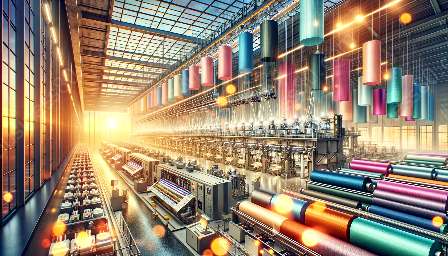The fashion industry has a significant impact on the environment and society due to the high consumption of resources and the production of vast amounts of waste. In recent years, the concept of sustainable fashion has gained increased attention as a response to these concerns. Sustainable fashion encompasses a range of ethical and environmentally-friendly practices that aim to minimize the negative impact of the fashion industry on the planet and people.
When delving into the topic of sustainable fashion, one cannot overlook the interconnection with fashion merchandising. This field focuses on the promotion and sales of fashion products, and it plays a crucial role in shaping consumer behavior and influencing the industry's sustainability practices. Moreover, with the increasing demand for sustainable products, fashion merchandising must adapt to ensure that ethically produced and environmentally friendly apparel reaches the market in an effective and appealing manner.
Within the context of textiles & nonwovens, sustainable fashion is closely tied to the materials used in clothing production. Textiles and nonwovens play a fundamental role in sustainable fashion practices, as the use of eco-friendly and recycled fibers, as well as innovative production methods, can significantly reduce the environmental impact of the fashion industry. The integration of sustainable textiles and nonwovens in the fashion supply chain is essential for achieving a more sustainable and responsible industry.
The Impact of Sustainable Fashion
Sustainable fashion extends beyond simply using organic materials or reducing waste. It requires a comprehensive approach that considers the entire lifecycle of a garment, from design and production to consumption and disposal. The impact of sustainable fashion can be examined from various perspectives, including environmental, social, and economic aspects.
Environmental Impact
Traditional fashion production processes often involve the extensive use of water, chemicals, and energy, leading to pollution and depletion of natural resources. In contrast, sustainable fashion practices seek to minimize these negative effects through innovative technologies, eco-friendly materials, and responsible manufacturing processes. For example, the adoption of circular fashion principles, such as designing for longevity and recyclability, can significantly reduce the environmental footprint of fashion products.
Social Impact
From a social perspective, sustainable fashion aims to promote fair labor practices and improve working conditions throughout the supply chain. By supporting ethical production and fair wages, sustainable fashion endeavors to protect the rights and well-being of workers, particularly in developing countries where much of the fashion industry's production takes place.
Economic Impact
Embracing sustainable fashion can also have positive economic implications. While the initial costs of sustainable materials and ethical production may be higher, the long-term benefits can include reduced resource consumption, lower waste management costs, and increased brand value due to a commitment to sustainability. Furthermore, as consumer awareness and demand for sustainable fashion continue to grow, businesses that prioritize sustainability are likely to gain a competitive advantage in the market.
The Role of Fashion Merchandising in Promoting Sustainable Fashion
Fashion merchandising encompasses a wide range of activities, including retail management, product development, and marketing. In the context of sustainable fashion, merchandisers play a crucial role in driving consumer awareness and influencing purchasing decisions. By effectively communicating the value of sustainable fashion and highlighting the unique features of eco-friendly products, merchandisers can cultivate a demand for more responsible clothing options.
Moreover, by partnering with sustainable fashion brands and incorporating eco-friendly collections into their product offerings, fashion merchandisers can contribute to the mainstreaming of sustainability in the fashion industry. Creating captivating retail experiences that showcase the sustainability efforts of brands can help educate consumers and inspire them to make conscious choices when it comes to fashion purchases.
Textiles & Nonwovens: Innovations for Sustainable Fashion
The field of textiles and nonwovens is at the forefront of driving innovation in sustainable fashion. Through the development of eco-friendly fibers, recycling technologies, and sustainable production methods, textile professionals are paving the way for a greener and more ethical fashion industry. The use of recycled polyester, organic cotton, and biodegradable textiles are just a few examples of how textiles and nonwovens are contributing to the sustainability movement.
Additionally, advancements in nonwoven technologies have opened doors for sustainable solutions in garment production, such as reducing waste through efficient cutting techniques and developing biodegradable nonwoven materials. These innovations offer a promising outlook for the future of sustainable fashion, where textile and nonwoven experts continue to explore new materials and processes that align with environmental and ethical principles.
Education and Awareness in Sustainable Fashion
As the fashion industry undergoes a paradigm shift towards sustainability, education and awareness play a vital role in shaping the future of fashion merchandising and textiles & nonwovens. By integrating sustainability into fashion education programs, future professionals can gain the knowledge and skills needed to drive positive change within the industry. This includes understanding the principles of sustainable design, ethical sourcing, and responsible production methods.
Furthermore, raising awareness among consumers about the impacts of their purchasing decisions is essential for creating a demand for sustainable fashion. Through marketing campaigns, transparent labeling, and educational initiatives, fashion merchandisers can empower consumers to make informed choices and support sustainable brands. Similarly, textiles and nonwovens professionals can contribute to consumer education by highlighting the environmental benefits of sustainable materials and production processes.
Collaboration for a Sustainable Fashion Future
Building a sustainable fashion industry requires collaboration across various sectors, including fashion merchandising, textiles & nonwovens, design, manufacturing, and consumer advocacy. By fostering collaboration and knowledge-sharing, these interconnected fields can work together to develop innovative solutions, implement best practices, and drive sustainable change throughout the fashion supply chain.
Ultimately, sustainable fashion represents a collective effort to create a more ethical, environmentally conscious, and socially responsible industry. Through the convergence of fashion merchandising and textiles & nonwovens, the fashion industry has the opportunity to embrace sustainable practices that benefit both the planet and its people.

